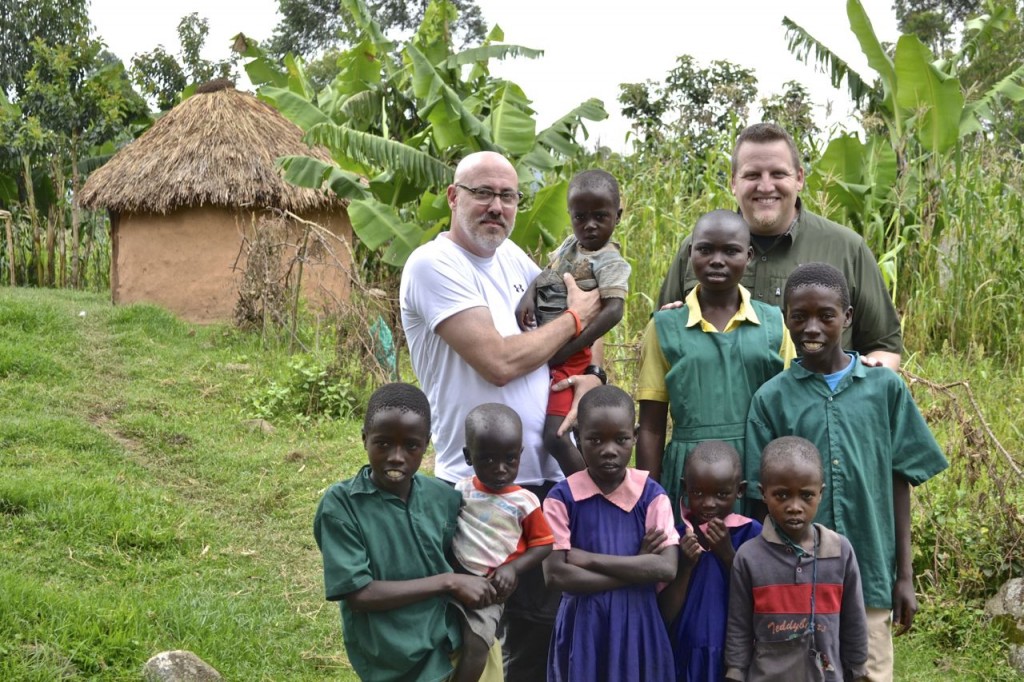(Note: This story originally appeared in the Loudonville Times pg. 8 on 7/17 and the Ashland Times Gazette pg 1 on 7/20)
New Hope pastors get close look at child sponsor program in Kenya
By Jim Brewer T-G Staff Writer
 Rob Paterson and Tom Roepke, respectively the lead and student pastors at New Hope Community Church, spent a week in Kenya, Africa, to witness firsthand the child sponsorship program of Compassion International.
Rob Paterson and Tom Roepke, respectively the lead and student pastors at New Hope Community Church, spent a week in Kenya, Africa, to witness firsthand the child sponsorship program of Compassion International.
The two local pastors were the guests of Compassion International, one of the larger and, in some circles, considered the best of several child sponsorship organizations around the world.
Estimates say more than 9 million children worldwide are enrolled in some sort of child sponsorship program, and more than $5 billion a year is being channeled into sponsorship programs.
The New Hope pastors were invited by Steve Caton, a representative of the church software program New Hope subscribes to — Church Community Builder — who also is an affiliate of Compassion International, to be the guests of the organization and see its work directly in the field. Also taking the trip was Caton’s 16-year-old son, Dylan, who raised funds through sponsorship arrangements to accompany them on the trip.
On June 11, the pair embarked on what would be a 28-hour flight from Ohio to Nairobi, the capital of Kenya. From Nairobi they flew west about 200 miles to the city of Kisumu on the shore of Lake Victoria, and from there they rode what Roepke referred to as a “jungle bus” to two Compassion International projects, “where we were shown,” Roepke said, “how $38 can make a difference in a child’s life.”
“First off, the place where they took us was really, really remote, and we were told that we were the first white people the children in these settlements had ever seen.” Roepke said. “While the funds for the program came from America and other countries like it, the work was carried off mostly by Kenyan nationals and largely funded through local churches back in the U.S. For instances, a church in Houston invested $25,000 in child sponsorship programs, creating a safe education and nurturing environment for 250 children.”
…child sponsorship builds communities and builds churches.
Also while in Kenya, the pair had a chance to walk through a portion of the Kiberi slum, where, Paterson said, “I fully felt the impact level of poverty that made me an emotional mess. The houses there were no more than 6-foot by 12-foot shacks, without heat, running water or sanitary sewer systems.”
“Yet, we talked and prayed with families there,” Paterson said. “We blessed the people there, and they blessed us as Americans. We could see the joy on their faces, and felt the knowledge that God would bless them.”
The Kiberi slum is a very small area on the outskirts of Nairobi, a city of 3.5 million, where more than a million people live in abject poverty. It is considered the largest slum area in the world.
While he has been abroad before, Roepke said this is the first trip like this he has taken. Paterson said he took a trip like this once before to the Middle East.
Roepke said they were invited on the Compassion International trip as a way “of putting us in their network. It was an educational opportunity for us, and a way for them to get their message out to more people.”
The biggest value Roepke sees in child sponsorship “is that it provides educational opportunities for children who otherwise would not have them, and extended, the educated child has a much greater opportunity to lead an economically fulfilling life and improve the lot of his fellow countrymen. In short, child sponsorship builds communities and builds churches.”
He based this statement on an investigative story published last month in Christianity Today magazine,
Want to Change the World? Sponsor a Child
which took a very close look at the Compassion International child sponsorship program.
“Sponsored children, as they grew up, are more likely to get and hold a good job, in many cases a salaried job. Ironically, a large number of sponsored children ended up as teachers of adults, rather than holding menial positions,” the magazine article stated. “We found evidence that sponsored children, as they grow up, are much more likely to become community and church leaders.”